I was scrolling through my files of photos I’ve taken of different pieces of ecclesiastical embroidery and came across these photos of a chasuble embroidered with the Last Supper and other images. So I thought I’d share them with you.
The chasuble itself is not embroidered – the motifs (as is often the case) were originally embroidered on separate pieces then appliqued together and fitted onto a chasuble. This whole piece looks to me like a bit of a salvage job: I think the embroidered cross and bands were probably on a different vestment originally. The vestment itself was probably too worn for church use, so the embroidery was salvaged and put onto a different chasuble.
The embroidered part is probably not old, though. I would say it’s no older than the early – mid 1900’s. The gold is certainly worked in imitation Japanese gold.
Apology in advance: these are not my clearest photos! I didn’t have my new camera when I took them.
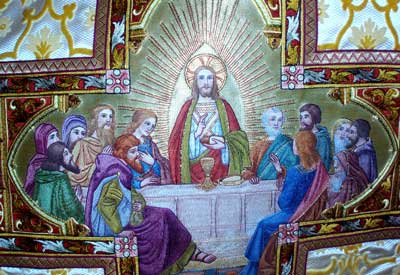
The image of the Last Supper is on the back of the chasuble, centered in the cross section of the cross.
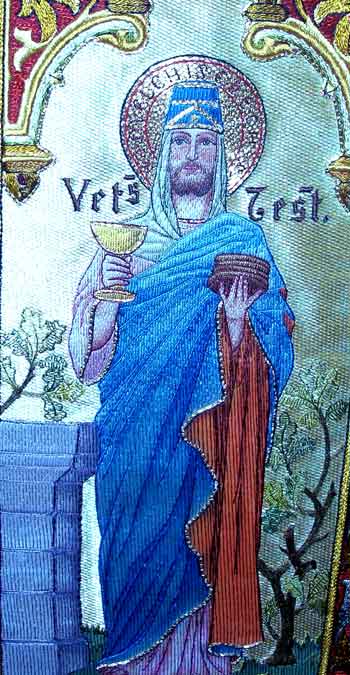
Below the Last Supper is an embroidered image of Melchisedech, the high priest in the Old Testement. The allusion is to Christ, the High Priest, “after the order of Melchisedech.”
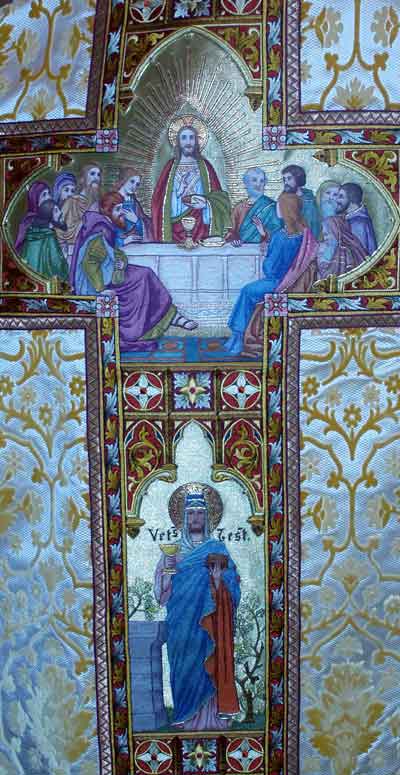
Here you can see both images positioned on the chasuble. I guess I couldn’t get in the whole cross. There is a motif below Melchisedech as well:
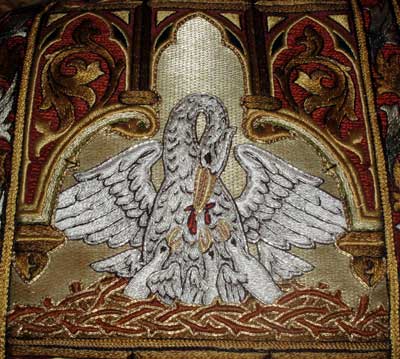
The Pelican is used as well as an image of Christ, as it was thought that the pelican would feed its young from its own flesh.
And some close ups (as best as I could get them) from a few of the scenes on the back of the chasuble:
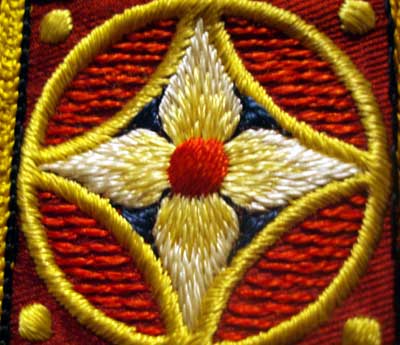
The shading on these is nice. They’re about 2″ square.
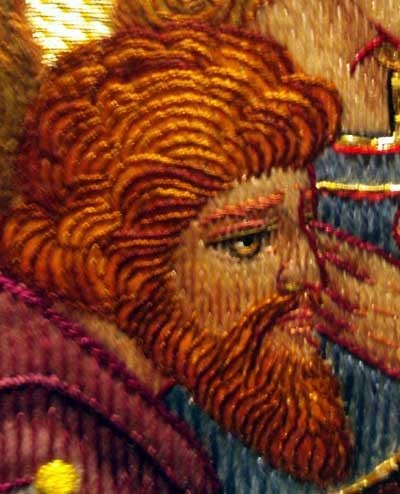
A close-up of one of the apostles – note the detail in the eye. Even though the photo’s a bit blurry, the eye really is amazingly detailed.
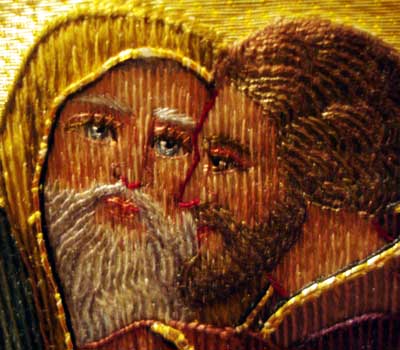
Two other apostles. I always find it funny, when you look at these pieces up close, how strange the eyebrows look!
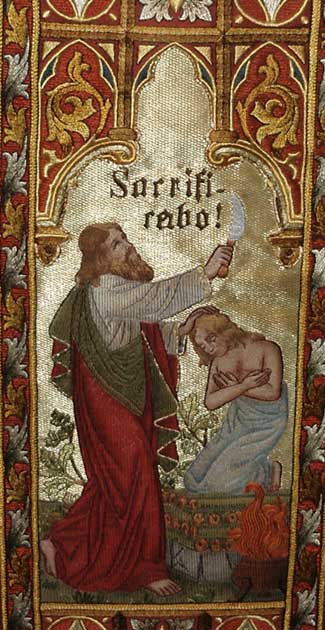
On the front of the chasuble is the sacrifice of Isaac, another image from the Old Testament.
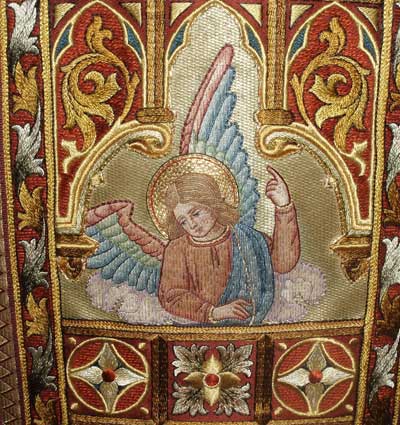
Above the sacrifice of Isaac is this little embroidered angel. I like it. I like the way the lifted wing fits in the arch!
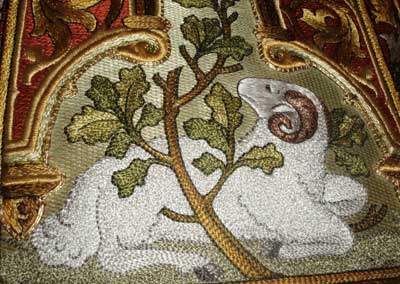
And below the sacrifice of Isaac is the image of a ram, also an allusion to sacrifice.
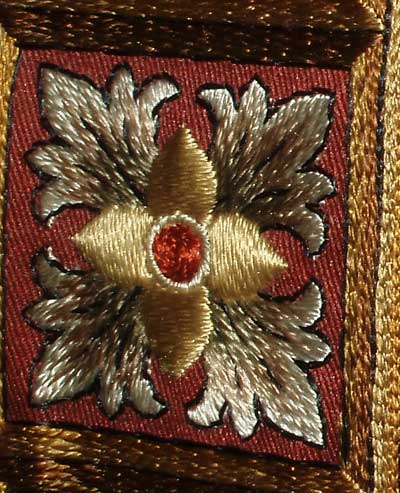
And here’s a close up of another one of the decorative medallions. Nice satin stitch!
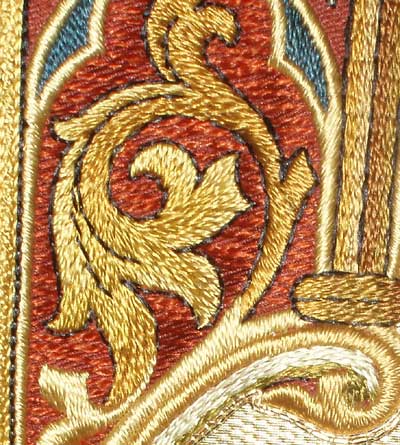
And here’s a relative close up of one of the acanthus-type designs that set off the arches around the figures. Really, the padded satin stitching is exquisite.
Imagine – just imagine! – the work that went into these pieces. I’d love to re-create something similar to this… maybe not the same theme, but on the same scale! How many years do you suppose it would take one person to manange that? !!!


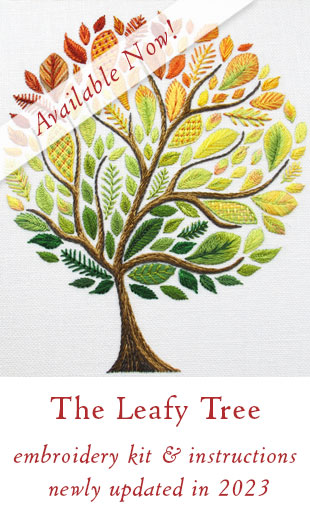
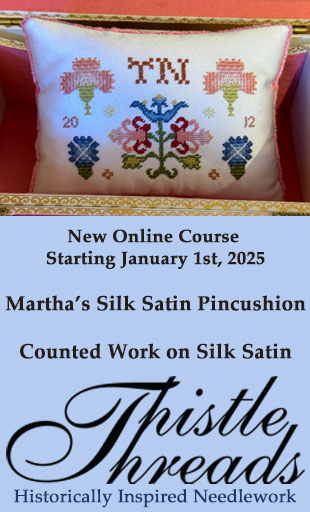
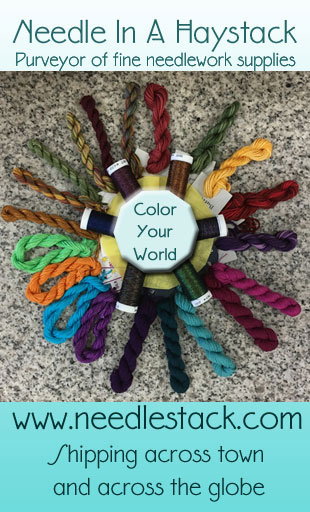

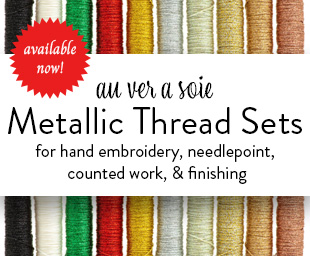
Wow!!!! Now this is really amazing!!!
I sure would love to be able to claim this kind of work.
Wendy
I’ve really been wanting to see some embroidered acanthus – so this is just brilliant! Thankyou!
I’m in love with the second last photo – the gold flower with silver ‘leaves’. Going to have to do that somewhere, sometime!
Hi, Mary, Thanks for the photos. Really interesting. Do you know what kind of stitches are used in the faces? They don’t look like long and short or split stitch. It looks almost like they have a foundation with some shading over the top. What do you think? I am working on an icon, silk on silk with lots of long and short needlepainting right now. thanks, Anneg
Hi, Anne –
On this particular piece, it looks as if they lay a foundation of long long-and-short stitch, slightly off angle to the split stitch lines on top. The lines on top are long, even split stitches, with the lines spaced evenly apart from each other so that the foundation shading shows through. I think in some pieces (not necessarily this one) that foundation is worked in a rougher cotton thread that’s got a tighter twist to it, then the top split stitched lines are worked in silk, which pick up the light. I have some photos of a pelican motif that I’ll post tomorrow that shows this a little bit better.
But in this piece, it looks like the foundation stitches are also worked in silk – soft stuff, rather than the rougher looking threads on the pelican.
Hope that helps!
I’d love to see a picture of your icon! I have a pattern for an icon that’s supposed to be worked entirely in split stitch. Some day I’ll get to it!
Hi! Me again, I would love to see the split-stitch icon pattern you mentioned. Could you post pictures of that too? please?
I LOVE split stitch. It is my favorite embroidery stitch so far.
-Christiana
I’ve just bought a chasuble with these designs on it, very good condition, but they are on a different material background–apparently very old, as the vestment is well-worn.
What can you tell me about the one you photographed?
Thanks for any info!
Best,
Richard Balthazar
Hi, Richard – I can’t really tell you anything about the provenance. This one was apparently removed from an older chasuble and remounted on new fabric. It’s definitely hand embroidered, but that’s about all I can tell you!
Hello Mary,
Thanks for the post. I actually just procured a panel matching the Last Supper panel you show here, as well as several other beautiful peices made by the same artisan. What I don’t have to complete a set of Liturgical vestments is the front panel you show here which depicts the three scenes of Abraham about to offer his son, the angel who stops Abraham, and the ram in the thicket which was offered in his sons place. Do you know of anyone who would be able to replicate this front panel? Perhaps yourself? I would be so grateful with any direction or assistance you could offer.
I’m not able to take this type of commission work right now, much as I’d like to. It’s just too time consuming! You might check locally to see if there’s an embroidery guild in your area (if you’re in the US, look for the Embroiderers’ Guild of America). They may be able to put you in touch with someone local who could do it for you.
Everything is so perfect, it’s intimidating. Yet still I stitch away, despite my imperfections.